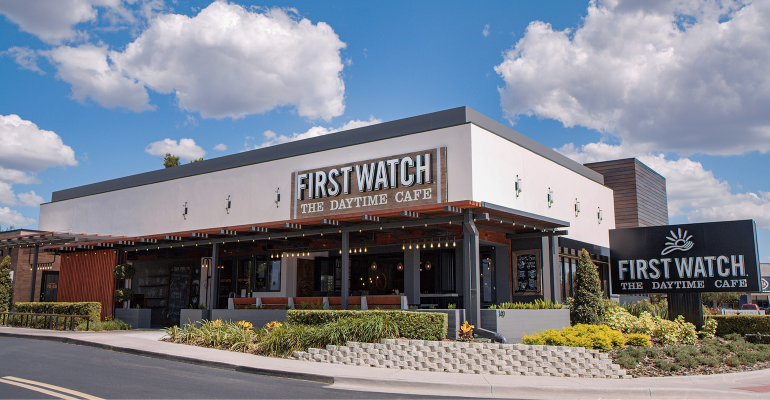In January, First Watch quietly added a new benefit that could be a game changer for the company and could also have major implications for the restaurant industry as a whole. The benefit provides childcare and elder care at a discount for all employees, part-time and full-time.
In partnership with its vendor Bright Horizons, First Watch employees pay $10 a day, or $15 if they have two or three children. If they don’t want to drop their children off at a partner center, they can use a caregiving site to search for a local sitter who has already been background checked and vetted to come to their house for $4 an hour. Bright Horizons has a 98% network match where First Watch restaurants are located.
“We heard over and over about the dilemma over childcare and also in many cases elder care, so we rolled out a partnership in January with Bright Horizons, a leading provider of backup child and elder care, to every single one of our employees. We’re basically subsidizing those costs,” Chief People Officer Laura Sorenson said during a recent interview at the Women's Foodservice Forum.
The benefit is still too new to understand use cases, but generally speaking, child care, and caretaking in general, has been a major roadblock for upward mobility in the industry, particularly for women. Sorenson said this challenge became compounded during Covid.
“You just had more people having more issues where a sitter would call in sick or the daycare couldn’t take them, and they had to weigh the difficult decision of ‘do I go to work, or do I pay for a sitter? What is financially feasible?’” she said.
The company decided to explore solutions because employees were sharing this as one of their biggest challenges during the company’s “WHY” Tour – an acronym for “we hear you” – in which executives, including CEO Chris Tomasso, host 90-minute calls in each market with hourly employees.
“We question them about their entire employment experience. It’s like an engagement survey on steroids. And because we’re doing it where we’re actually talking to and listening to them instead of through a one-dimensional piece of paper, it’s more effective to help change people’s lives for the better,” Sorensen said.
Knowing caretaking was a hindrance to some employees’ careers, First Watch began exploring the feasibility of adding such benefits. However, Sorenson said it was hard to get started because “we haven’t seen this in the industry.” The company also knew it wanted to ensure any type of program would be accessible to every employee.
“That was the key for us because a lot of benefits are sometimes focused on just those who have insurance or just at the manager level,” Sorenson said. “I want to make sure whatever we’re doing, we’re pushing it out to people who need it.”
Though it’s too early to understand the full impact, Sorenson said there have already been dozens of employees who have leveraged the program. Further, feedback has been resoundingly positive.
“When I talk to employees about benefits, this one gets mentioned as a real ‘wow’ for people,” she said. “Many of them don’t have children, it’s just knowing we put something into place that their coworkers can use because they know it’s such an issue and it puts a burden on the overall restaurant. Just knowing the service is there is such a home run, even for people who don’t need it.”
As more employees learn about and leverage the benefit, Sorenson said First Watch will measure success the same way it does all of its benefits – recruitment, retention, culture. It’s that culture piece that will be the most challenging as First Watch continues to grow, aspiring to get to 2,200 restaurants in the long term from its current 530 or so.
“How do you hold onto that as we grow? By making sure in addition to continuing to invest in great, new, beautiful restaurants, we’re also investing in people … As fast as we’re growing, also making sure we’re slowing down to take care of our people,” she said.
There could also be a much broader return in sharing what has the potential to be a best practice for this industry, long challenged by nontraditional and sometimes unpredictable hours. Sorenson said other companies have reached out to inquire about the benefit to potentially adopt something similar. Such benefits could boost recruitment and retention while also alleviating some of the cost burdens that come with such care.
The benefit could also help repair that so-called “broken rung,” in which women’s professional ascension rates are lower than their male counterparts’ and is often driven by disproportionate caretaking responsibilities. According to McKinsey’s “Women in the Workplace 2023” report, women’s representation in the c-suite has increased to 28 percent throughout the past nine years, but the middle of the pipeline remains challenged; for every 100 men promoted from entry level to manager, 87 women were promoted. That number drops to 73 for women of color.
For First Watch and Sorenson, the caretaking benefits not only create more opportunities for women, they also support a more holistic approach to bettering employees’ mental health.
“Companies will continue to move forward here,” Sorensen added. “This is the new expectation, and employees are right to have those expectations.”
Contact Alicia Kelso at [email protected]

